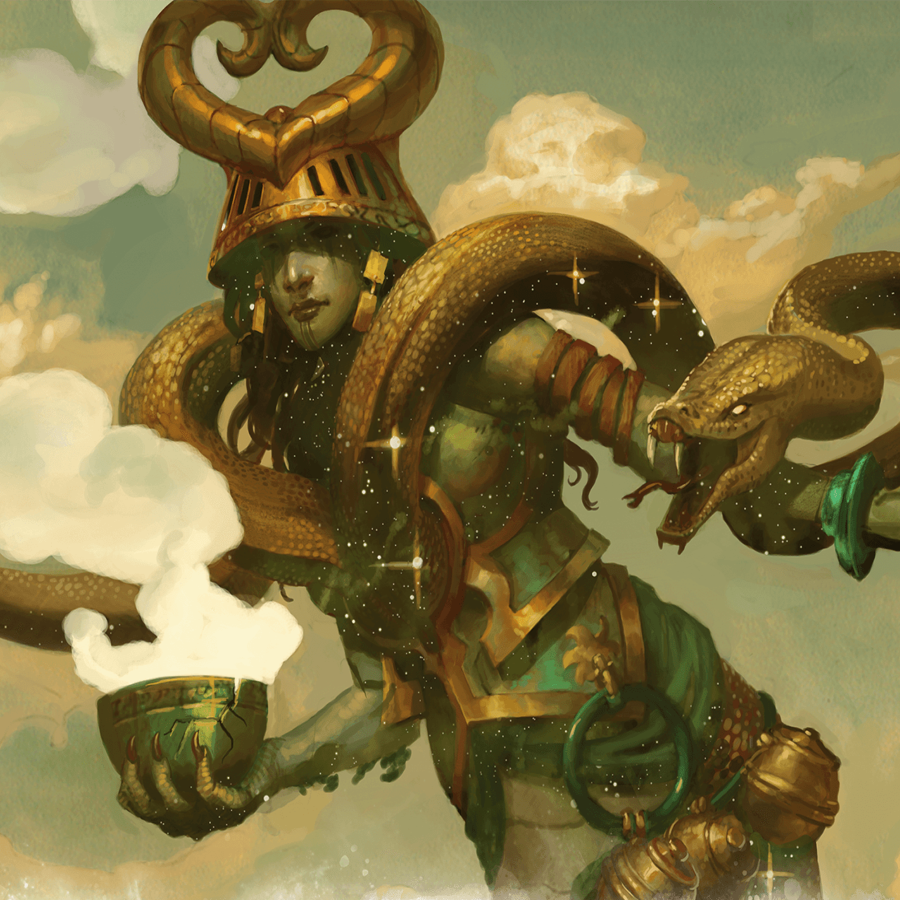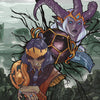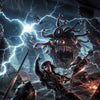The 7 Core Roles of a Game Master

Written by Luke Hart
Some of the most amazing game masters I’ve played with excel at certain aspects of the game, as you might expect. For instance, my friend Joe is an amazing game designer. He creates adventures and dungeons that are just incredibly interesting to play. How he designs his maps and encounters makes the game an amazing experience.
The reverse is also true. Some of the worst game masters I’ve played with fail miserably in certain aspects. For instance, I was once at a convention, and the game master was a horrible storyteller. It wasn’t because she wasn’t trying to tell a story; however, because that’s all she cared about, she consistently stole our agency in order to tell the story she wanted to tell.
None of this should be news to anyone. It’s rather obvious, I think. However, what often isn’t obvious is that amazing game masters usually aren’t amazing at every aspect of the game. Instead, you find that they excel at one or two parts of the game but fall flat in other parts. However, because they are amazing in a couple of aspects, it pushes them into the realm of being an amazing game master.
The reverse is also true of bad game masters. They might be OK or average in most parts of the game, but it only takes them being horrible in one or two aspects for them to shift over into the category of being a bad game master.
So, today, we’re going to go over the seven fundamental game master roles that a good game master should always be seeking to improve upon. These roles fit into seven categories, which include the duties and responsibilities that game masters have when they’re running the game. It doesn’t matter if it’s DUNGEONS & DRAGONS, Pathfinder 2, Dungeon Crawl Classics, Shadow Dark, Shadow Run, Savage Worlds, or Call of Cthulhu: the basic game master roles are fairly universal.
Watch or listen to this article by clicking the video below.
Now, as a game master, you’ll find that some of these roles come naturally to you and others don’t. Your goal should be to improve upon them all, hopefully taking the roles you’re naturally good at and pushing them into the realm of exceptional. For the roles that you’re maybe not so good at, try to shore up your deficiencies there so you’re OK or average at them. Once you begin to accomplish that, you’re going to excel more and more as a GM, and your games will pass into the realm of amazing.
This article will examine each of these seven rules and discuss what they encompass and what they are. In the future, we will examine each of the seven roles in more detail and deep-dive into how to improve them as game masters.
#1 Arbiter
Perhaps the very first primary role of a game master is serving as a referee, often known as an arbiter or judge. The basic idea here is that, when you’re running the game, you are officiating over the rules. When a player declares they want to do X thing, you use the game rules and your own judgment to determine what happens.
This includes determining limitations in the game. For instance, if a player declares that they wish to convince the king to make them a noble in charge of their entire household, the game master may decide that isn’t even possible. It is outside the scope of what a character can do with their diplomacy skills. Now, of course, the game master might respond that if the characters were to go on a certain mission of great value to the king and get in his good graces, a minor noble title might be on the table.
Furthermore, besides just adjudicating the rules, you’ll often find yourself becoming a teacher of the rules. This frequently comes into play when you have a newer player, but many of the games we play have lots of rules, and even veteran players probably won’t know all of them. Shoot, as the game master, you’re unlikely to know them all, either. I’ve been running Pathfinder 2 games for a year and still don’t know all the rules. I’m looking them up frequently, and my players are helping me to find and remember what they are. That’s just the way it often is.
But in order to adjudicate for or teach the rules, you obviously need to know the rules as well as you can. And even though you’re likely to never learn or remember all of them at all times, the goal is to consistently get better at knowing them and learn them more and more as you run the game. Sometimes, you just have to do the best you can, which includes making up a ruling because you don’t want to spend 30 minutes trying to find it in the books.
#2 World-builder
This role is one that many game masters love. Some of us could spend all day or all week simply creating our game worlds. Maps and geography, cities, the different types of soldiers that make up the armies of those cities, government systems, kings and nobility, different organizations that fill the world, such as merchants and nefarious power-hungry groups—the list goes on because worlds are massive things with a lot in them.
I’d wager that some game masters would be perfectly content with only world-building, and if they never actually got to run the game for players, they would be OK with that. And that’s cool; I won’t tell you not to do that. However, I will say that if you are creating an amazing world that you are excited about, you might be doing our world a disservice by not sharing it with a group of, say, five players.
Some game masters use pre-made worlds. I am one of those game masters. My Pathfinder 2 game takes place in Eberron, and my 5th edition D&D game takes place in the Forgotten Realms. Of course, we are literally transitioning right now to running my Escape from the Fey module, which is the sequel to my Into the Fey module. Escape from the Fey takes place in a world that I created.
That said, even when using pre-made worlds, I still have to read about that world, learn about it, and then portray and present it to my players at the game table. So, even though I didn’t literally create the world, I am still building it for my players. Even if you are using a pre-made game world, you’ll always find that it doesn’t have everything you need, so you will need to create world elements to fill in those gaps.
Thus, every game master is a world builder, regardless of whether you make your own world or use one that someone else created.
#3 Game Designer
The role of game designer is probably the one I enjoy most, and it’s probably what I’m best at as a game master. I mean, I think I am. Remember that your players are probably the best judge of what you are good or bad at as the game master.
What do I mean by “game designer?” Well, this role includes several elements, but for me, it mostly encompasses creating adventures because they usually form the meat of your game sessions. I would venture a guess that 80 to 90% of the game is going on adventures. Now, this might be dungeon crawling, hex crawling, or investigating points of interest, but those are all grouped into the general category of adventures.
As the game master, when you design these adventures, you consider such things as the three pillars of play: social interactions, exploration, and combat. You have to balance these pillars so your adventures appeal to most player types. You do things like ensuring that there are various difficulties in combat. You create points of interest that your players can explore—places that pique their interest and get them excited. You look at your players’ backstories and consider if there are elements you can pull into your adventures or the campaign, and then consider how you can implement those elements.
Often, you create the maps for your adventures and then design what is in the rooms or corridors. You may be designing new traps or puzzles and creating the treasure and rewards your players will earn as they adventure. And you’re making sure that you distribute those rewards in a way that is equitable to all players. As you design these elements that make up your game, you’re crafting them very intentionally so they will appeal to your players and drive fun at your game table.
As I said, this is my favorite part of being a game master. I love designing adventures. Many times, when my wife and I go on vacation, I still get up around 4:00 or 5:00 in the morning. I’ll first take the dog out to go to the bathroom, and then I come back, fire up my laptop, and start working on an adventure for my Pathfinder 2 game. It’s something that I just find enjoyable. It’s tons of fun.
However, another part of game design that may not be intuitive is that of improvisation. Every game master will find that no matter how much they design a game in advance, unexpected things will happen at the game table, and you will have to design the game on the fly. We usually just call this improv, but it is a big part of game design because, depending upon your game table, anywhere from 20% to 80% of a given game session might be improv. It’s not necessarily because you didn’t prepare enough but because your players decided to do something you just didn’t anticipate.
#4 Director and Lead Storyteller
In my opinion, this role is often misconstrued, misinterpreted, or implemented incorrectly. You see, some game masters consider themselves the storyteller—the only storyteller. They seek to essentially write a book with their games, transforming them from a game into more of a narrative that the players have very little or no control over. Game masters like this, in their quest to tell the story they have in mind, rob their players of agency and the ability to affect the game world around them. So, you don’t want to be a game master like that.
However, as a game master, you are the lead storyteller. When you design your game world, you could do it in such a way that it lends itself to certain types of stories, events, and situations that might happen. Obviously, when you are making an adventure, every single one starts off with a premise, a back story, a situation, or something that is happening. A bad guy is doing something that is having a negative consequence on the world, and your players’ characters usually need to stop that bad guy.
By setting up this adventure, you are beginning the act of storytelling. Then, your players continue that active storytelling through what their characters say and do during the adventure. As the game master, you are aiding in that endeavor because you’re deciding what the bad guys and other NPCs in the world do in response.
This is why I say that you are the lead storyteller. You set things up and put things in motion. You are, in essence, the director of the story. You help determine the high-level strokes, and your players help fill in the details. It is a shared collaborative storytelling experience, but as the game master, you do take the lead role.
#5 Entertainer
Naturally, this leads us to the next main game master role, that of entertainer. When I design my adventures and create world elements, and when I run my games during the game sessions, almost everything I do revolves around one principal objective: making the game more fun for everyone, players and me. At its core, one of the things you’re doing as a game master is providing entertainment for everyone at the game table.
Think about it. Without the game master, there wouldn’t even be a game. You are the catalyst; you are the beginning of even the potential of fun. Now, some people will tell you that it is your job as the game master to ensure that all of your players are having fun. However, I’m going to say that in no uncertain terms are you capable of doing that. It is impossible for you to make sure and guarantee that every single player has fun. No, no, I wouldn’t even try to do that. You will fail.
Instead, I submit that your actual goal is to create an environment for fun. In other words, you can’t control how players react to your game, how they react to your adventures, or how they react to your NPCs, but you can control the environment. You can set things up so it is very likely that your players will have fun; you just can’t guarantee it.
So, do not feel bad if some of your players don’t have fun. Do not feel bad if every game session isn’t amazing. Do not feel bad if some players leave your games because it’s not what they’re looking for. I recommend that you simply focus on improving your games and doing your best to create this environment for fun. As you improve as a game master, you’re going to find that more and more of your players are consistently having fun.
Some very specific things lean very heavily into this role of entertainer. For instance, one of the things you’re probably going to find yourself doing is role-playing NPCs. For many game masters, this means acting insomuch that you are physically portraying their body language and perhaps even speaking in a special voice you created for that NPC. Even though this is something that some game masters don’t feel comfortable doing, it is definitely something players tend to enjoy. So, if you give it a shot, it can make your game a whole lot better for everyone.
#6 Diplomat
Ah, yes, the role that probably almost no game master actually enjoys. The diplomat role places you into the shoes of the recruiter. You need to find people to play in your games; you need to be an ambassador for your game. Many times, this isn’t too challenging since game masters are in short supply and there are a plethora of players, but your mileage may vary, of course.
I suspect that the part of being a diplomat that most game masters enjoy the least, me included, is that of a moderator or mediator. This means that when conflicts arise in your game, whether between two players or between a player and you, you have to know how to resolve them. This may mean stepping in and saying or doing something or having the wisdom to know when to keep your mouth shut.
And then, of course, we have the issue of dealing with problem players. If you are a game master for any length of time, you will have these players in your groups. And if they are left undealt with, and whatever problems they are causing remain unresolved, your games will suffer.
I want to be very clear here that the game master should not be the only diplomat, mediator, or person who deals with problem players in their games. Ideally, this should be a shared responsibility for game masters and players. However, as the game master, it is your role to take the lead on this. You can ask your players for assistance, or you might ask them for advice on how to deal with a certain situation. But it needs to be you taking the initiative because you are the game master; you are running the game.
#7 Manager
This is probably a role that many game masters don’t enjoy, either. You see, I saved the most unsavory roles for last, I suppose. One of the things a manager does is organizing. They take notes and keep track of house rules so they can find and reference them later; they know the adventure and where and how to reference their notes quickly so gameplay doesn’t slow down.
The other part of being a manager is that of an administrator. You coordinate game times and durations and send out emails or leave a message on Discord about a week before a game session to remind players of the date and time (and see who might not come). If someone’s not going to be at a game session, you can then find a backup player or figure out how the group will handle their absence.
100 Years of GM Experience at Your Fingertips!
Are you a NEW GAME MASTER feeling a bit overwhelmed by everything involved with running a role-playing game? Are you a VETERAN GAME MASTER looking for new tips and tricks to take your games to the next level? Look no further than the Secret Art of Game Mastery.
We at the DM Lair have distilled our CENTURY of accumulated GM experience into an easy-to-read guide of practical advice that you can immediately apply to your games! We've even included our own templates–the things that we use to prepare our ACTUAL games.
Get all three books to master your game:
- The Secret Art of Game Mastery. Contains over 100 years of GM advice distilled into an easy-to-read format. It introduces and explains the tools of the trade, scheduling, playstyle, post-game notes, getting player feedback, and more.
- The Secret Art of Preparation. Brings to your fingertips the actual templates and guides that the DM Lair team uses to prepare games, Lair Magazine, and more. Designed as a three-ring binder, it's intended for you to write directly into for your entire campaign!
- The Secret Art of Notetaking. Gives you the keys to tracking your campaign from session to session just like the DM Lair team. Designed as a three-ring binder, it's intended for you to write in and keep track of your whole campaign!
With so much knowledge and experience on its pages, The Secret Art of Game Mastery is guaranteed to become an indispensable tool for all game masters, new and veteran alike. And if that isn’t enough, the information applies to all game systems and all genres!
-
Posted in
Game Master How-To Articles







